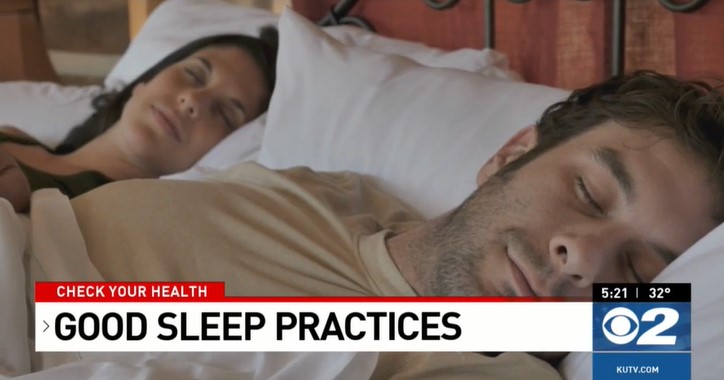About a third of adults worldwide report experiencing insomnia, an actual sleep disorder characterized by difficulty falling or staying asleep.
“People normally fall asleep between 10 and 30 minutes of laying down and closing their eyes,” says Lori Neeleman, PhD, a clinical psychologist at Intermountain Healthcare. “But as a culture, we often want things fast and easy, but sleep prefers a slower arrival than what many people want or have come to expect.”
Here are seven tips to help people fall asleep and stay asleep:
1.Lower the temperature
Core body temperature decreases slightly during the night and a bedroom on the cool side allows for heat to dissipate through the skin into the air which Neeleman says can help facilitate the decrease in core body temperature. Experts suggest an ideal thermostat temperature between 60 – 68 degrees Fahrenheit. Although Neeleman says this can vary by individual, so find a temperature that is most comfortable for you. A room that is too warm can lead to sleep that is more restless and less restorative in part due to comfort and in part due to the difficulty the body has in cooling itself for sleep.
2.Be consistent with what time you go to bed and wake up each day
Sleep is primarily controlled by two separate but related systems. The first is the circadian rhythm or 24-hour rhythm that is associated with the light/dark cycle and rhythms of sleep, wake and activity. The homeostatic system is the second system and is related to the build-up of sleep pressure throughout the waking period that helps facilitate falling asleep and better-quality sleep.
Neeleman says these two systems work in tandem to support humans in sleeping at night and being active and alert during the day.
“A consistent wake time in particular helps to anchor these systems at a particular point in time which helps to facilitate getting sleepy about the same time at night due to a stable rhythm and adequate sleep pressure,” says Neeleman.
3.Avoid napping too long and late in the afternoon
Naps taken late in the afternoon and lasting longer than 45 minutes can disrupt your body’s natural sleep-wake cycle, making it harder to fall asleep at night.
Naps longer than 45 minutes can also result in grogginess when you wake, while shorter naps can help you feel refreshed. Neeleman suggests a nap lasting less than 30 minutes early in the day, generally before 3 pm, can provide a boost in focus and alertness and is unlikely to interfere very much with nighttime sleep
However, naps are often discouraged for people who aren’t sleeping well at night. To determine whether naps are impacting your night-time sleep, Neeleman suggests charting your sleep with and without naps to get a clearer picture of their effect.
4.Exercise regularly
Morning exercise can send a strong wake signal, helping the brain and body understand that it is time to be awake and active for the day. Neeleman says when this occurs on a regular basis it helps improve circadian strength and alignment.
Regular exercise is also known to aid in stress management and can help ease depression and anxiety, which are often associated with poor sleep and exercise may exert some of it’s positive effects by improving these conditions.
5.Turn off screens at least an hour before bedtime
Electronic devices emit a short wavelength of light, often termed “blue light” that stimulates non-visual receptors in the eye that connect with the timekeeper in the brain with a message that it is daytime.
“When this occurs at night, the brain’s release of melatonin can be suppressed which can contribute to difficulty falling asleep or poor-quality sleep,” says Neeleman. “Bright light also has an effect on alertness, so bright light at night coming off screens or bright home lighting can also impair sleep.”
Neeleman also says stimulating content, whether it be in the form of the latest binge-worthy series, social media posts, gaming, or other stimulating information can also contribute to sleep disturbance.
6.Practice meditation
A meditative state is often one of quiet centeredness which won’t induce sleep but can invite sleep under the right circumstances.
Regular meditation practice is known to benefit the brain and has multiple positive effects on well-being, coping with chronic conditions, and quality of life.
“For those who have a noisy mind that interferes with sleep, the ability to notice, allow, and let go of thoughts rather than ‘hooking in’ can be invaluable in creating space for sleep,” said Neeleman.
7.Try deep breathing techniques
Slow easy breathing sends a message to the body and brain of safety which in turn leads to a sense of relaxation and calm which can help to set the stage for sleep.
Neeleman says a slowed breathing with a slightly longer slower exhale may be particularly helpful for calming the nervous system in preparation for sleep.
“The key is to slow your breath, filling the lungs to a comfortable degree and then exhale slowly, like a deep sigh,” says Neeleman.
It’s also recommended to practice breathing methods at a time other than when going to bed for a few days before applying them at bedtime. Anything new, even a variation on breathing, can detract from the relaxed state ideal for sleep.
8.Know when to seek help and manage sleep expectations
Difficulty falling asleep is common, but if it routinely takes you longer to fall asleep than 10 to 30 minutes or you find yourself using medications, consult with your doctor or a sleep professional.
“Early education and intervention can help prevent short term problems from becoming chronic,” says Neeleman. “It’s important to note that most people will have difficulty falling asleep occasionally and/or when under a lot of stress. Managing stress and expectations about sleep can often be helpful on its own.”

